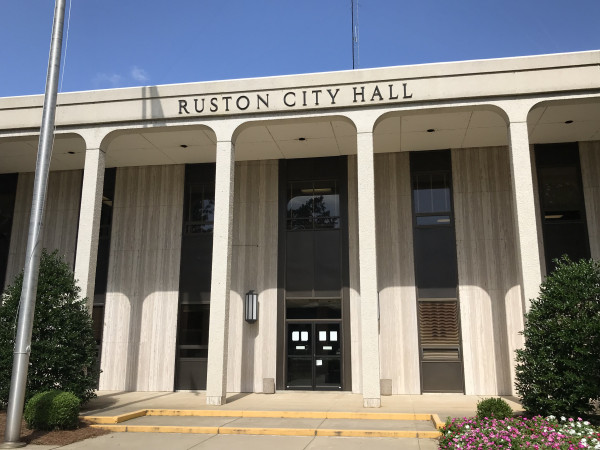City to begin restoring some workers’ status on Monday

At least part of the economic slowdown caused by the novel coronavirus will end Monday for approximately 238 Ruston city employees.
Hourly workers whose work weeks were cut to 30 hours, and salaried employees who took pay cuts but continued to work full 40-hour weeks, will be restored to their previous status on Monday, Mayor Ronny Walker said Wednesday.
The change affects 205 hourly employees and 33 salaried employees.
The restorations will happen because Louisiana’s elongated stay-at-home order didn’t have as severe an impact on April sales tax collections as Ruston officials had feared.
Figures provided by City Hall show collections were down only by 11%, or $146,610, in April of this year compared to April of 2019.
“We’re just ecstatic,” Walker said.
He said the city is still being cautious with spending because the now-expired statewide stay-at-home order is also expected to have an impact on May sales tax revenue. The gubernatorial order wasn’t lifted until May 15.
Most businesses throughout the city were closed, or severely scaled back, throughout the entire month of April as a result of the stay-at-home order aimed at curtailing the spread of the novel coronavirus.
April’s 11% drop is considerably less than what city officials had anticipated when the economy began to shutdown.
Walker said Wednesday he was figuring on as much as a half-million dollar decline.
Julie Keen, Ruston’s chief financial officer, attributes the lesser loss to the impact of heavily shopped essential businesses that were allowed to remain open and the amount of takeout and curbside business done by local restaurants.
The April figures show the city collected approximately $1.24 million in sales tax this year compared to approximately $1.4 million in 2019.
The city’s four dedicated sales taxes, including the Moving Ruston Forward tax, brought in roughly $1.1 million, a 7% drop from 2019, while the hotel-restaurant tax dropped to $98,584, a decrease of 34% from 2019.
Officials said the biggest portion of the hotelrestaurant decrease came from lack of travelers.
The economic development district that includes the Ruston Marketplace shopping center on Cooktown road had an almost 100% drop.
That’s because the shopping center didn’t open until later in the spring of 2019.
Citywide sales tax collections for March — the month the stay-at-home orders began — were down about 9% compared to 2019. Businesses began to shut down, and restaurants cut back to takeout and delivery only on March 23; that meant tax revenue was down for only about nine days in March.
In early April, the city announced it was laying off all of its part time employees and contract workers, furloughing 21 employees and cutting pay for others in light of the economic slowdown caused by the virus.
Almost the entire city workforce of about 300 people felt the impact of the changes.
The plan was originally scheduled to be in place up to 90 days, but would go on a month-to-month basis depending on sales tax income, Walker said at the time. Most of the city’s payroll is funded through sales tax.
Meanwhile, Walker said Wednesday he’s still concerned that the number of cases of COVID-19, the illness caused by the novel coronavirus, will spike as Louisiana continues to lessen restrictions on large gatherings and as people move about more.
The state is scheduled to enter Phase Two of the White House’s Opening Up America Again economic recovery plan on Friday.
“I realize people want to get out and will get out. We just still need to be serious about washing our hands and social distancing,” Walker said.
Wednesday’s daily COVID-19 update from the Louisiana Department of Health showed Lincoln Parish with 161 confirmed cases since the local count began in March and 16 deaths. That’s two additional deaths. The parish had held steady with 14 COVID-19 deaths since May 19.

